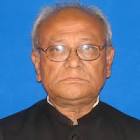Ali, Shawkat

Ali, Shawkat (1937-2020) military officer, Freedom Fighter, lawyer and politician. Shawkat Ali, one of the accused in the agartala conspiracy case (1968) and the founding Chairman of Muktijoddha Sanghati Parishad, was the Deputy Speaker of the Ninth Parliament. Shawkat Ali was born on 27 January 1937 at Dighirpar village of Lonsingbah of Naria upazila of Shariatpur district. His father’s name is Munshi Mubarak Ali and mother’s name is Maleka Begum.
He received his LLB degree from Dhaka University. He was commissioned in the Ordnance Corps of the Pakistan Army in 1959. While serving in the army, he was accused (accused no. 26) of the 1968 Agartala Conspiracy Case filed by the Ayub government. He was arrested on 10 January 1968 from Mali Cantonment in Pakistan and was released from detention in Dhaka Cantonment on 22 February 1969. He was given forced retirement from the Pakistan Army in the same year.
Shawkat Ali actively participated in the Liberation War in 1971. He served as a Commander and Instructor in the sub-sector under sector 2 during the war of liberation. He also served as Staff Officer of Armed Forces Headquarters at Mujibnagar. After independence, he joined the Bangladesh Army. After the assassination of Bangabandhu Sheikh Mujibur Rahman and his family members in 1975, he was sent to retirement from the army. At that time, he was the Director of Ordinance Services at the Headquarters of the Bangladesh Army in the rank of Colonel.
After retiring from the army, he became active in the legal profession and Awami League politics. Joined Bangladesh Awami League in 1977. He became a member of the Supreme Court Bar Association in 1978 and was appointed a member of the Central Executive Committee of Bangladesh Awami League in 1979.
In 1979, he was elected Member of Parliament from Shariatpur-15 constituency as a candidate of Bangladesh Awami League. In this Parliament, he served as the Whip of the Awami League Parliamentary Party and as a member of the Parliamentary Standing Committee on Ministry of Relief and Rehabilitation. He was imprisoned for about 16 months (May 1982 to September 1983) during military rule of General Ershad and in 2003 during BNP-Jamaat coalition government headed by Begum Khaleda Zia.
He actively participated in the mass movement of1990s against the military regime. Later, he was elected member of parliament as a candidate of Bangladesh Awami League from Shariatpur-2 constituency in the fifth, seventh, eighth, ninth and tenth Parliaments. As a member of parliament elected six times, he served as president and member of various important parliamentary committees.
In the fifth national parliament, he served as the chairman of the committee on private members’ decision proposals and the parliamentary standing committee on the ministry for shipping. In addition, he served as a member of the Petition Committee, Government Accounts Committee and the Parliamentary Standing Committee on Defense Ministry.
In the eighth Parliament, he was nominated a member of the Parliamentary Standing Committee on the Ministry for Defense and the Committee on Private Members’ Bills and Private Members’ Resolution Proposals. He served as Deputy Speaker (25 January 2009 to 24 January 2014) and Acting Speaker (22 March 2013 to 30 April 2013) of the ninth Parliament. In the tenth Parliament, he was the Chairman of the Parliamentary Standing Committee on Government Institutions.
Colonel Shawkat Ali has written a number of books on his life, works and politics. His notable books are Satya Mamla Agartala, Karagarer Diary, Bangladesher Muktisangram o Amar Kichu Katha, From Ganoparishad to Nabam Sangsad and Armed Quest for Independence. Shawkat Ali is the father of two sons and one daughter. On 16 November, 2020, he died of covid-19 while under treatment at the Combined Military Hospital. He was suffering from old age problems too including kidney, diabetes, high blood pressure. He was buried in the family graveyard in Naria upazila. He was 83 years of old at the time of his death.
Shawkat Ali remained steadfast to Bangabandhu’s ideals and the spirit of Liberation War. [Sharif Ahmad Chowdhury]
